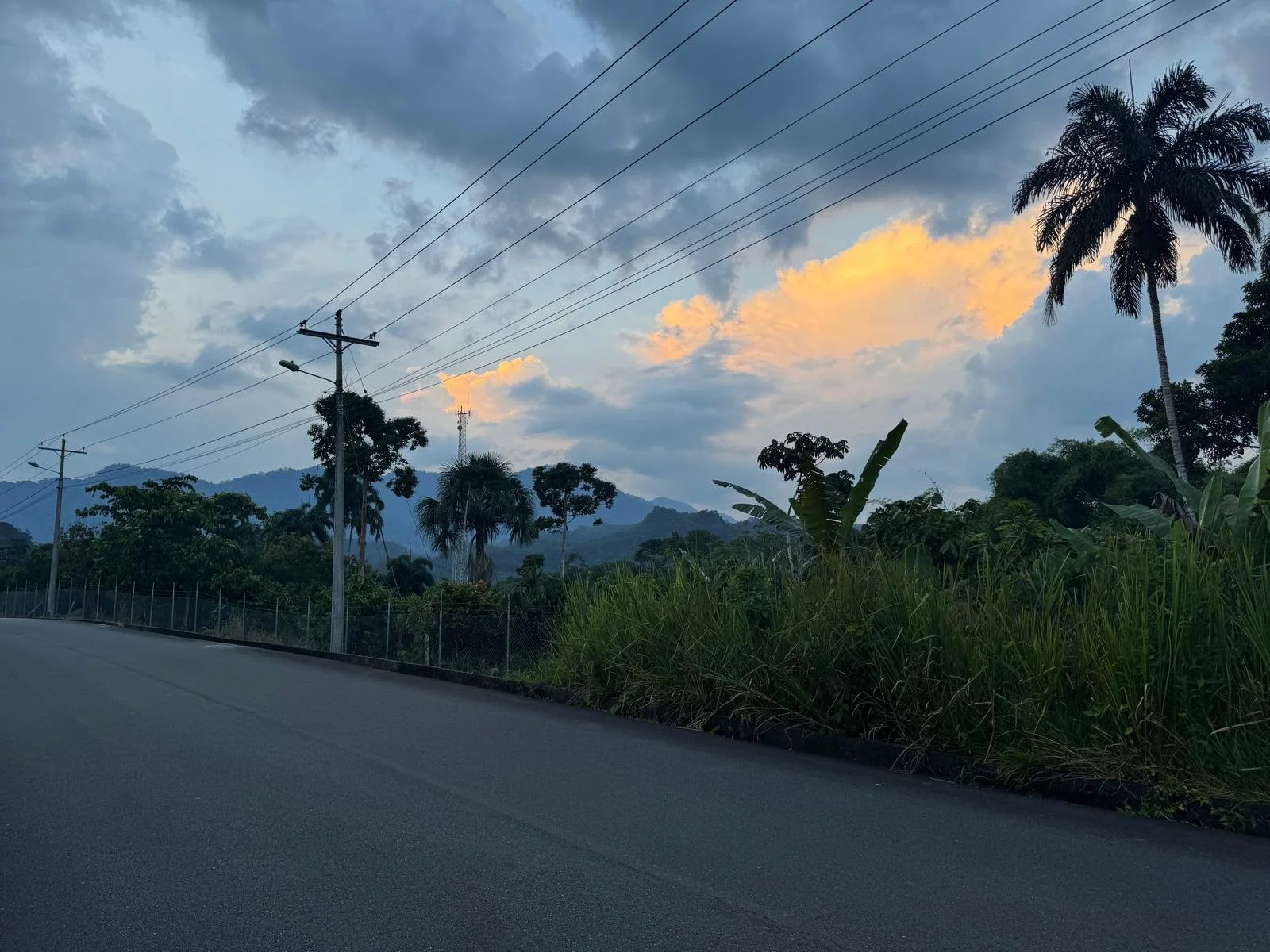By: Leo Saunders, Program Coordinator, Spring ‘25
As we left our single-night hotel in Quito, one of my fellow program coordinators donned a pair of four-lensed glasses designed to prevent motion sickness. The taxi ride began smoothly, but by the third hour of winding mountain roads, I fully understood her reasoning. Slowly, Quito’s high-altitude desert climate faded, giving way to the verdant Amazonian landscape. Flat, rocky plains were replaced by sheer, vine-covered cliffs, carved over centuries by glacial meltwater.
After a fifteen-minute detour—during which we struggled in broken Spanish to explain to our taxi driver that he had taken us to the wrong destination—we finally arrived in Talag. Our home for the coming months, referred to as “Casa Talag,” is a three-story building, of which we occupy the bottom two floors. The third remains unfinished. During heavy rainstorms, the tin roof roars like a jet taking off—only slightly louder.
The first thing I did upon arriving was take a shower, which was frigid but refreshing, and surprisingly easy to acclimate to. I now rely on it to stay cool during the sweltering Ecuadorian days.
Life in Talag follows a slower rhythm than what I’m used to. Each morning, we set out on foot for Shandia, a nearby community where we volunteer. The walk, though beautiful, often leaves me drenched in sweat or rain, depending on the weather—and sometimes both. Much of my time in the community feels more like play than work. Hanging out in the office during recess can be chaotic; trying to catch balls flung at my head makes playing card games all the more challenging. I am often baselessly accused of cheating.
“¡Haces trampa!” the kids exclaim, clinging to my legs to prevent me from walking away—my punishment for unfairly winning at Uno. The energy of the classroom environment is hardly different. Walking through the school, I am greeted by shouts of excitement and enthusiastic waving. Often, my entry to the classroom is met with a round of applause. In the younger classrooms, kids bolt from their desks to hug us.
Lunchtime hardly offers a respite from the chaos, as we crowd into the kitchen to prepare meals. Every Wednesday, though, our lunches are truly peaceful, spent at the Shandia Lodge—a genuine luxury. Most meals are home-cooked, using a mix of grocery store ingredients and what we can find at the community shops. Sometimes, the heat calls for a cold treat, with frozen, chocolate-covered bananas being a particular favorite among the group.
One evening, some of the Program Coordinators bought chicken for dinner, not realizing they had accidentally purchased two whole birds. A community member gave us a crash course in preparing them—removing the head, feet, and organs included. By the second chicken, I felt I had the process down.
Another cultural difference that caught me off guard was the unique method of shaking hands. In the U.S., a firm handshake is admired and, in some cases, expected. Here, handshakes are softer, often performed without closing one’s fingers. When I first experienced it, I assumed it was a fluke, but after a few times, I adjusted my handshake to match. Sarah fondly refers to the method as “the dead fish.” I like to think I’ve mastered it by now, given how common handshakes are.
Three weeks in, the biggest change hasn’t been the odd handshakes, the unpredictable rain, or even butchering a chicken—it’s been the sense of impact I feel. Here in Shandia, it truly seems like the things I do matter—helping kids learn, sharing meals with friends, walking long distances through a beautiful landscape, speaking a new language (even if clumsily at times). It’s a different kind of fulfillment, one that comes not from getting ahead but from being present.
Three weeks down, and I’m already starting to feel at home.
About the Author
Leo Saunders is a gap year student from San Francisco, California, preparing to attend Colorado College next year. During his year of non-traditional learning, he is immersing himself in service, ecology, and nonprofit work, gaining hands-on experience beyond the classroom. Passionate about storytelling through photography, Leo is actively honing his skills while exploring new perspectives. In his free time, he enjoys reading, running, and capturing the world around him through his lens.
Interested in spending your gap year in Ecuador? Learn more here.

